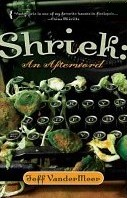
Adhering to my (newly-found) policy of not posting book reviews, what follows is not a review of Jeff VanderMeer’s
Shriek: An Afterword, but rather just my thoughts on the book.
A recurring, and not entirely undeserved, criticism of the fantasy genre is that its works emphasize plot over characterization. In the usual genre novel, the criticism generally goes, the characters exist to experience and move the plot along, and as a consequence the characters in fantasy tend toward the simplistic and archetypal. To the extent that this criticism is true,
Shriek stands as a shining exception to the rule. This book is a wonderful example of a character-driven novel, with the emotionally and morally complex brother and sister, Duncan and Janice Shriek.
Within the fantasy genre, I suppose an apt comparison might be made to China Miéville’s
Perdido Street Station, inasmuch as both books interject the reader into a unique and fascinatingly surreal urban environment in a world all the more disturbing for being somewhat reminiscent of our collective reality. (Humans, after all, dominate both Ambergris and New Crobuzon.) But for all of its innovation, of setting, of language, of treatment, and for all of its wonderfully imagined characters,
Perdido Street Station still functioned within the confines of plot. (Freytag would have no difficulty in recognizing its basic structure.) Still, I believe the comparison apt for Shriek will certainly prove as important to the genre as Miéville’s seminal work.
Shriek, however, mostly eschews plot, and very effectively so, as it does not so much really matter what happens in Ambergris—the reader gets slightly different versions from the two main characters anyway—as how Janice and Duncan react, how they feel and think and grow as events unfold. VanderMeer’s organization of the novel is rather simplistic. The story proceeds in a more or less linear fashion, loosely following the career of Duncan Shriek as historian, teacher, journalist, disregarded revolutionary. There are no dream sequences, and few, if any, flashbacks. POV does not shift among multipicitous characters. But again, coming up with a different way to present tired, old plot tropes is not an issue for VanderMeer;
Shriek is not that kind of fantasy.
I suppose, indeed, that the out-of-the-ghetto critics might claim that
Shriek: An Afterword is not fantasy at all. Where are the wizards in pointy hats, the flighty elves, the fire-breathing dragons, the muscle-bound heroes and buxom heroines? Plus, genre writing is plot-driven, is it not? Ergo . . . (you fill in the blanks.) So, what is it, fantasy or literary fiction? Literary fantasy? (Can there be such a thing?) I mean, my god, there's a typrewriter on the cover. A typewriter! And mushrooms! How can that be fantasy?!
I don’t know what it is that VanderMeer has done here, not really, not at least to go so far as to pigeonhole
Shriek as this, or that, or this but not that. You decide. I will say this: I read fantasy in all of its forms; I read it all and I know what I like. This I like.



